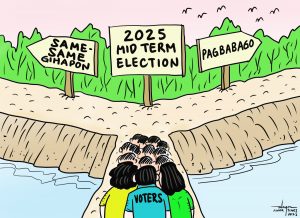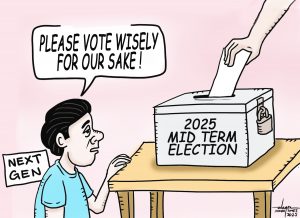Finally, Davao City’s second district Councilor Javi Garcia Campos III makes himself clear to his fellow Councilors who are with the Hugpong sa Tawong Lungsod (HTL).
Javi filed his certificate of candidacy – no, not for reelection as councilor but for Congressman of the second district. And yes, he is running under the banner of President Ferdinand Marcos, Jr.’s party. Not quite surprisingly too, is that he was accompanied by former First District Congressman Karlo Nograles who is now chair of the Civil Service Commission (CSC) after he was reappointed by Marcos, Jr.
Seemingly, the line between the local administration and the near dormant opposition is now fully drawn. Maybe, after many elections past, Next year’s local polls in Davao City could possibly be exciting.
Of course what the people of Davao are eagerly waiting is whether or not the Marcos, Jr.’s Party will field a candidate for mayor and if ever it will, who could it be. We have until today to wait. If there will be it could not be coming from any other political family in the first district. He or she could only be from the Nograleses.
Meanwhile, who will HTL field in the second district to oppose Javi Campos. Not former Councilor Danny Dayanghirang who could be a cinch since he has followings. Yesterday Danny already filed his COC for councilor in his district.
Besides former Councilor Danny we could not think of any name who has the “it” to pull a surprise against the long-ruling Garcias in that particular district. Of course there is former Vice Mayor Luis Bonguyan who could be a resident of the second district. Assuming he is, will he be prodded by the HTL ,the party of former President Duterte, his close associate, to cast his lot.
On the other hand, as it was in the past many elections in the city, the leaders of the HTL are allowing more candidates for councilors bringing the name of the party. And like in the previous elections they will be allowed to join HTL rallies; given opportunity to speak thereat despite the fact that only eight candidates are officially carried in the Hugpong ticket.
The catch however, for this strategy is that whoever from the bets outside of the ticket will make it to the magic eight, he/she/they still belong to the same party of the local administration.
Very astute idea indeed.
******************************
A local environmentalist group, the Interfacing Development Interventions for Sustainability (IDIS), was reported in yesterday’s local papers as saying that the push of President Ferdinand “Bongbong” Marcos, Jr. for Waste to Energy (WTE) projects to address flooding in the country is “dangerous, and won’t address the flood problem.” IDIS added that it is “not only misleading but also dangerously simplistic.”
Earlier Marcos, Jr. asked Congress for the immediate approval of the WTE Bill now passed on third reading by the House of Representatives but still pending for passage on second reading at the Senate.
During a meeting of the Legislative-Executive Development Advisory Council (LEDAC) in Malacanang the President told members that the WTE bill is “an important discussion in flood control.” Hence the immediate passage of the bill is necessary.
Of course it is common knowledge that all WTE projects will also dabble as provider of electric power. But for it to produce the energy it has to burn the waste that comes from the garbage thrown by industries, business establishments and households.
It is in the process of incinerating the thousands and thousands of tons of waste materials that the IDIS feel would instead put environment in a more precarious situation. The emission coming from the burned waste could generate health hazards to the people, IDIS believes.
With this in mind the people behind IDIS think that pushing for the passage of WTE Bill is not addressing the problem of flood in certain areas of the country more specifically the urban centers.
They believe that the WTE as solution does not take into consideration the root causes of the flooding problem.
They cited factors as “inadequate drainage systems, alteration of natural waterways, loss of wetlands due to urban development, siltation and climate effects particularly increased in storm intensity, rainfall frequency and sea level rise.”
Very well said, and if we may add, the unabated “rape” of our forest, the destruction of farmlands that were once planted to fast water-absolving crops, the flattening of hills to give way to high-end residential subdivisions overlooking the lowlands, and the loosely restricted quarrying of riversides and hilltops of various aggregates for infrastructure construction.
But then again, it is already a given that addressing the flooding problem taking into consideration the earlier-mentioned root causes is apparently late in coming. Doing flood control projects along those identified root causes could already be much difficult to undertake as many communities and people are likely to be adversely affected. Projects along those parameters would also be much costlier.
In the case of WTE projects we think that our environment protection advocates must consider the potential level of advantages the projects could bring to the communities and the people, and compare these benefits to the possible adverse effects.
Say, garbage and other waste from industries, business establishments and households will not anymore remain uncollected as these will have to be hauled on regular basis to feed the incinerators. In the process potential diseases that emanate from the dumped garbage could be obviated. Moreover supply of electricity produced within the community through WTE plants may reduce energy cost.
As to the perceived health hazards brought about by the emission from the WTE incinerators, there is no doubt that its dangers can better be mitigated than having uncollected garbage or those dumped in canals and other waterways causing the spread of diseases.
With all these dynamics as expounded by the IDIS we cannot help but be reminded of a quote made by our professor from the University of the Philippines (UP) who was teaching in an audit classes for Public
Administration we took years ago which says:
“The real measures of the success of any development project is when there are more beneficiaries enjoying the benefits than the number of sufferers.”


